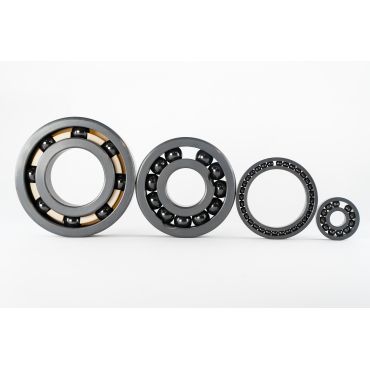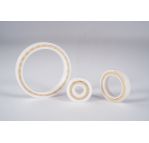
Ceramic bearings in Si3N4 for shaft sizes from 3mm up to 50mm
See product table below for dimensions and technical drawings
See Products Variants below for ZrO2 options
Si3N4, or silicon nitride, is a very hard but also very light ceramic material. Si3N4 has excellent resistance to water, salt water and many acids and alkalis. It also has a very wide temperature range and is suitable for use in high vacuum applications. The extreme hardness of silicon nitride also means greater brittleness so shock/impact loads should be minimised to avoid the risk of cracking. A silicon nitride bearing is only 40% of the weight of its steel equivalent.
As full ceramic Si3N4 bearings have high hardness, very smooth wear surfaces and are generally supplied without lubrication, they are often used in applications that require extremely low turning resistance. Full ceramic bearings have a very low coefficient of friction compared to steel bearings or even hybrid bearings. The coefficient of friction for unlubricated silicon nitride bearings at ambient temperature in air with a light load is approximately 0.001.
Unlike zirconia, silicon nitride has a low coefficient of expansion so care should be exercised when choosing shaft fits for higher temperature applications as a steel shaft will expand much more than the silicon nitride inner ring which could lead to ring fracture. In the same way, a steel housing will expand much more than a silicon nitride outer ring, leading to a looser fit at high temperatures.
The Si3N4 full ceramic ball bearings in the table below are available with cages (or retainers) made from PEEK, PTFE. Bearings with bore sizes from 8mm upwards can also be fitted with 316 stainless steel cages. In addition, we keep stock of full complement silicon nitride bearings. These have no cage and extra balls. For full complement type, the load ratings are approximately 20% higher but the maximum speed is up to 70% lower. As for bearings with cages, PEEK cages are generally the option available from stock due to the strength and durability of PEEK. If an alternative cage material is required to cope with particular chemicals or temperature extremes beyond the range of PEEK, these can be produced to order. Si3N4 bearings are not magnetic and they are highly corrosion resistant to most chemicals. They are also electrically insulating. Like ZrO2 bearings, they are also extremely water resistant which is why they are often used in marine applications. They can be fully and permanently submerged without the material being affected. Due to their greater brittleness, Si3N4 bearings have slightly lower load ratings than ZrO2 bearings but will still cope with much higher loads and speeds than 316 marine grade bearings.
Full complement Si3N4 bearings can be used up to 1200°C. Bearings with a PEEK cage are rated up to only 250°C while silicon nitride bearings with a 316 stainless steel cage can be used up to 500°C. Although silicon nitride expands much less than ZrO2, it is still advisable to specify greater internal clearance at high temperatures to avoid problems caused by radial play reduction. Our silicon nitride bearings are supplied with a C3 loose radial play as standard.
For temperatures below -70°C it is worth considering PTFE or 316 stainless steel cages due to their better low temperature performance. For an overview of the pros and cons of silicon nitride bearings, you can click HERE to see our ceramic bearing selection guide.
Most of the range of Si3N4 ceramic bearings are supplied from stock in the UK. We also keep ZrO2 full ceramic bearings in stock. See Products Variants below for the ZrO2 versions.
Click on INFO in the rows below to display technical drawings of the bearings with load and speed data. Please note that the maximum loads and speeds are used in theoretical life calculations. It is recommended to use bearings at significantly less than the maximum load and speed ratings to ensure reasonable bearing life. Si3N4 full ceramic bearings are best used with low to medium speeds and loads due to their greater brittleness.

